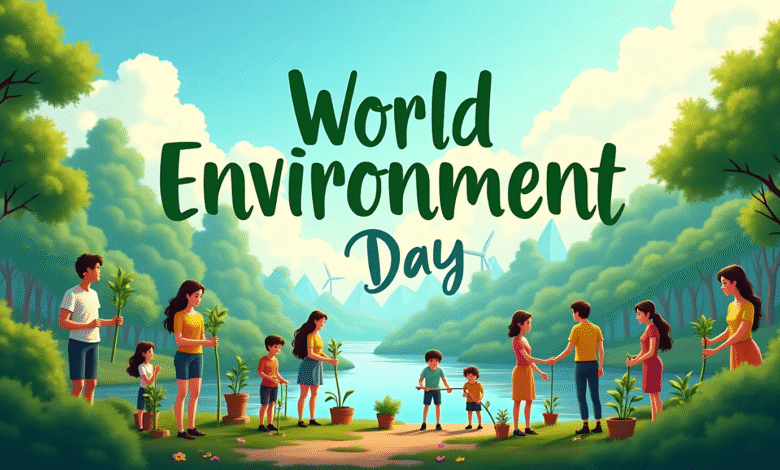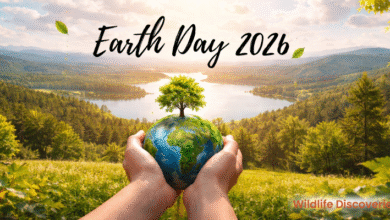World Environment Day 2025: Significance, History, Objective, Theme & Hosting Country
Actions for a Greener Future

Significance of World Environment Day
World Environment Day (WED) is the United Nations’ principal platform for fostering global awareness and action for the environment. Celebrated annually on June 5th, it serves as a reminder of our collective responsibility to protect and preserve the planet. WED has become a global movement, engaging governments, businesses, communities, and individuals in efforts to address pressing environmental challenges.
For instance, in 2024, WED was hosted by the Kingdom of Saudi Arabia with the theme “Land Restoration, Desertification, and Drought Resilience.” This theme underscored the urgent need to restore degraded lands and combat desertification, aligning with the UN Decade on Ecosystem Restoration (2021–2030) .
Looking ahead, the Republic of Korea is set to host WED in 2025, focusing on ending plastic pollution globally. The event will take place on Jeju Island.
Why June 5th Matters
June 5th was chosen to commemorate the opening day of the 1972 United Nations Conference on the Human Environment in Stockholm. This historic conference marked the first major international gathering focused on environmental issues, laying the foundation for global environmental governance. By observing World Environment Day on this date, we honor the legacy of that pivotal moment and reaffirm our commitment to environmental stewardship.
Historical Background
Origins at the 1972 Stockholm Conference

The 1972 Stockholm Conference was a watershed event that brought environmental concerns to the forefront of international discourse. Delegates from around the world convened to discuss the urgent need for environmental protection, leading to the establishment of the United Nations Environment Programe (UNEP) and the designation of June 5th as World Environment Day.
Establishment by the United Nations in 1973
Following the Stockholm Conference, the United Nations General Assembly officially established World Environment Day in 1973. This initiative aimed to encourage worldwide awareness and action for the protection of the environment, providing a platform for public outreach and engagement.
First Celebration in 1974

The inaugural World Environment Day was celebrated on June 5, 1974, with the theme “Only One Earth.” This theme underscored the singularity and fragility of our planet, emphasizing the need for collective action to safeguard its ecosystems. Since then, WED has grown into a global movement, celebrated in over 150 countries each year.
Latest Developments:
- 2024 Theme and Host: In 2024, WED focused on “Land Restoration, Desertification, and Drought Resilience,” hosted by the Kingdom of Saudi Arabia. This theme highlighted the urgent need to restore degraded lands, combat desertification, and build resilience against droughts. Notably, up to 40% of the planet’s land is degraded, directly affecting half of the world’s population and threatening roughly half of global GDP (US$44 trillion) .
- 2025 Theme and Host: The Republic of Korea is set to host WED in 2025, emphasizing the theme “Ending Plastic Pollution.” This initiative aligns with global efforts to develop a legally binding instrument on plastic pollution, addressing the full lifecycle of plastics. The event will take place on Jeju Island, recognized for its environmental projects, including the “2040 Plastic Zero Island” vision .
Objectives and Purpose
Raising Environmental Awareness

World Environment Day serves as a catalyst for raising awareness about critical environmental issues, such as climate change, biodiversity loss, pollution, and sustainable development. By highlighting these challenges, WED aims to inspire individuals and communities to adopt environmentally responsible behaviors.
- Latest Example: In 2024, the theme “Land Restoration, Desertification, and Drought Resilience” spotlighted the urgent need to restore degraded lands. Notably, up to 40% of the planet’s land is degraded, directly affecting half of the world’s population and threatening approximately half of global GDP (US$44 trillion) .
Encouraging Global Participation
WED fosters global participation by engaging diverse stakeholders, including governments, NGOs, businesses, and citizens. Through various events and campaigns, it encourages collaborative efforts to address environmental problems and promote sustainable practices.
- Latest Example: In 2024, over 150 countries participated in WED activities, with events ranging from tree planting to educational workshops, emphasizing the global commitment to environmental action .
Promoting Sustainable Practices
A key objective of World Environment Day is to promote sustainable practices that minimize environmental impact. This includes advocating for renewable energy, waste reduction, conservation of natural resources, and the adoption of eco-friendly technologies.
- Latest Example: In 2024, WED emphasized the adoption of renewable energy solutions, highlighting that renewable sources accounted for 28% of global power. This shift aims to reduce annual CO₂ emissions, which stand at 36 gigatonnes, and address the challenges of land degradation affecting 25% of the Earth’s surface
Annual Themes and Host Countries
Understanding the Importance of Themes
Each year, World Environment Day is centered around a specific theme that reflects pressing environmental concerns. These themes guide the focus of global campaigns and activities, helping to raise awareness and drive action on critical issues.
Notable Past Themes and Hosts
- 2018: “Beat Plastic Pollution” – India
India hosted WED 2018, focusing on combating plastic pollution. The campaign encouraged individuals and organizations to reduce single-use plastics and promote recycling initiatives. - 2019: “Beat Air Pollution” – China
China hosted WED 2019, highlighting the dangers of air pollution and advocating for cleaner transportation, renewable energy, and sustainable urban planning. - 2020: “Time for Nature” – Colombia (in partnership with Germany)
Colombia, in collaboration with Germany, hosted WED 2020 with the theme “Time for Nature,” emphasizing the importance of biodiversity and the need to protect natural ecosystems. - 2021: “Ecosystem Restoration” – Pakistan
Pakistan hosted WED 2021, focusing on ecosystem restoration and launching the UN Decade on Ecosystem Restoration (2021–2030), aiming to prevent, halt, and reverse the degradation of ecosystems worldwide. - 2022: “Only One Earth” – Sweden
Sweden hosted WED 2022, revisiting the original 1972 theme “Only One Earth,” to highlight the need for sustainable living in harmony with nature. - 2023: “Solutions to Plastic Pollution” – Côte d’Ivoire (in partnership with the Netherlands)
Côte d’Ivoire, supported by the Netherlands, hosted WED 2023, focusing on innovative solutions to plastic pollution and promoting a shift towards a circular economy. - 2024: “Land Restoration, Desertification, and Drought Resilience” – Saudi Arabia
Saudi Arabia hosted WED 2024, emphasizing the importance of restoring degraded lands, combating desertification, and enhancing resilience to droughts. Notably, up to 40% of the planet’s land is degraded, directly affecting half of the world’s population and threatening approximately half of global GDP (US$44 trillion) . - 2025: “Ending Plastic Pollution” – Republic of Korea
The Republic of Korea is set to host WED 2025, focusing on eliminating plastic pollution through innovative solutions and international cooperation. This initiative aligns with global efforts to develop a legally binding instrument on plastic pollution, addressing the full lifecycle of plastics.
Global Celebrations and Activities

Government Initiatives
Governments worldwide participate in World Environment Day by implementing policies and programs aimed at environmental protection. These initiatives may include legislation to reduce emissions, conservation efforts, and investments in sustainable infrastructure.
- Latest Example: In 2024, the Indian government launched the “Green India Mission,” aiming to increase forest cover and restore degraded ecosystems. This initiative aligns with WED 2024’s theme of “Land Restoration, Desertification, and Drought Resilience” and demonstrates a commitment to combating climate change and promoting sustainable development.
Community Engagement and Events

Communities celebrate WED through various activities, such as tree planting, clean-up drives, and environmental fairs. These events foster local engagement and raise awareness about environmental issues at the grassroots level.
- Latest Example: In 2024, over 150 countries participated in WED activities, with events ranging from tree planting to educational workshops, emphasizing the global commitment to environmental action.
Educational Campaigns and Workshops

Educational institutions organize campaigns and workshops on World Environment Day to educate students and the public about environmental conservation. These programs aim to instill a sense of responsibility and empower individuals to take action.
- Latest Example: In 2024, over 150 countries participated in WED activities, with events ranging from tree planting to educational workshops, emphasizing the global commitment to environmental action.
Current Environmental Challenges
Climate Change and Global Warming

Climate change remains one of the most pressing issues addressed on World Environment Day. Rising global temperatures, melting glaciers, and increased frequency of extreme weather events underscore the urgency of reducing greenhouse gas emissions. In 2024, global carbon emissions increased by 0.8%, reaching an estimated 41.2 billion tons of CO₂. Notably, India experienced a significant 4.6% rise in emissions, while the United States and the European Union saw reductions. These trends highlight the ongoing challenges and the critical need for global action to meet the Paris Agreement targets. Countries like Brazil are taking significant steps by committing to substantial emission reductions and implementing national climate plans. World Environment Day serves as a platform to highlight these efforts and encourage global action.
Deforestation and Biodiversity Loss

Deforestation, particularly in tropical regions, poses a severe threat to biodiversity. In Indonesia, large-scale deforestation projects for bioethanol fuel and agriculture are impacting forests the size of Belgium, threatening critical ecosystems and Indigenous communities. However, there have been positive developments; between August 2023 and July 2024, deforestation in the Amazon reached a nine-year low, with a 30.6% decrease compared to the previous year. This improvement is attributed to the restoration of environmental protection agencies under President Luiz Inácio Lula da Silva. World Environment Day brings attention to such issues, advocating for sustainable land management and conservation efforts.
Pollution: Air, Water, and Soil

Pollution in various forms continues to degrade the environment. Air pollution, especially in urban areas, leads to health problems and contributes to climate change. A recent study revealed that microplastics are significantly reducing global food supplies by impairing plant photosynthesis, potentially threatening millions with starvation. World Environment Day emphasizes the need for stringent pollution control measures and public awareness to combat these challenges.
Waste Management and Plastic Pollution

Improper waste management and plastic pollution are critical environmental concerns. Open burning of waste, prevalent in many regions, releases harmful pollutants and greenhouse gases. Plastic waste, particularly single-use plastics, accumulates in landfills and oceans, harming wildlife and ecosystems. In 2024, the Global Waste Management Outlook reported that the global direct cost of waste management was estimated at USD 252 billion, with hidden costs from pollution and health impacts bringing the total to USD 361 billion. Without urgent action, this cost could rise to USD 640.3 billion by 2050. World Environment Day campaigns often focus on reducing plastic usage and promoting sustainable waste management practices.
Individual and Collective Actions

Sustainable Lifestyle Choices
Adopting sustainable lifestyles is crucial in addressing environmental issues. This includes reducing energy consumption, using public transportation, conserving water, and supporting eco-friendly products. World Environment Day encourages individuals to make conscious choices that collectively contribute to environmental preservation.
- Recent Example: In 2025, citizens worldwide are embracing sustainable lifestyles through actions such as adopting plant-based diets, reducing single-use plastics, supporting local, sustainable businesses, and participating in community environmental projects.
Community Clean-Up Drives

Community involvement plays a significant role in environmental conservation. Organizing clean-up drives in neighborhoods, parks, and beaches helps reduce pollution and fosters a sense of responsibility. For instance, in Noosa, Australia, a local man’s dedicated beach clean-up efforts inspired the community to take similar actions . World Environment Day often serves as a catalyst for such community-led initiatives.
- Recent Example: In June 2024, the Grand Street Community Cleanup Day in Brooklyn, New York, brought together volunteers to clean up local streets, demonstrating the power of community action in environmental conservation.
Advocacy and Environmental Education
Educating the public about environmental issues is vital for long-term change. Youth activists like Sagarika Sriram have made significant impacts by promoting environmental education and organizing clean-up events . World Environment Day provides a platform for advocacy, encouraging educational institutions and organizations to raise awareness and inspire action.
- Recent Example: In 2025, environmental education has been integrated into school curricula in various countries, emphasizing the importance of sustainability and empowering students to take action in their communities.
Future Outlook

The Role of Technology in Environmental Conservation
Technological advancements offer innovative solutions for environmental conservation. From renewable energy sources to waste-to-energy plants, technology can significantly reduce environmental footprints. World Environment Day highlights the importance of investing in and adopting such technologies to build a sustainable future.
- Recent Example: In 2025, artificial intelligence (AI) is playing a pivotal role in environmental conservation. AI-driven systems are being used to monitor ecosystems, detect illegal activities like poaching and logging, and assist in biodiversity preservation. For instance, in China, satellite imaging combined with AI has been employed to detect forest fires at their inception, aiding in rapid response and containment. Additionally, AI algorithms are being utilized to predict poaching hotspots by analyzing migratory patterns and human activity, enabling more effective deployment of conservation resources.
Youth Engagement and Leadership
Engaging youth in environmental initiatives ensures the continuity of conservation efforts. Young leaders bring fresh perspectives and energy to environmental activism. World Environment Day encourages youth participation through educational programs, internships, and leadership opportunities, fostering the next generation of environmental stewards.
- Recent Example: In 2025, youth-led environmental movements are gaining momentum globally. Young activists are organizing climate strikes, leading community clean-up drives, and leveraging social media platforms to raise awareness about environmental issues. Educational institutions are also integrating environmental studies into their curricula, empowering students with knowledge and tools to take proactive roles in sustainability efforts.
Global Collaboration for a Sustainable Future

Environmental challenges transcend national borders, necessitating global cooperation. International agreements and collaborative projects are essential for addressing issues like climate change and biodiversity loss. World Environment Day serves as a reminder of the collective responsibility and the need for unified action to ensure a sustainable future for all.
Conclusion
World Environment Day offers an opportunity to reflect on our relationship with the environment. It emphasizes the importance of stewardship and the impact of our actions on the planet. Recognizing the interconnectedness of all life forms, it calls for a harmonious coexistence with nature. As individuals, we have the power to make a difference. By adopting sustainable practices, participating in community initiatives, and advocating for environmental policies, we contribute to the global effort of environmental conservation. Let World Environment Day inspire us to take meaningful actions towards a healthier planet.




